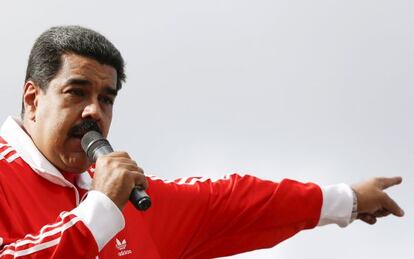Maduro rushes to appoint Supreme Court justices before losing Assembly
Venezuela opposition decries leader’s bid to maintain control over public powers

The Venezuelan National Assembly went into recess on December 16, but President Nicolás Maduro and assembly speaker Diosdado Cabello have called on its 165 members to participate in four extraordinary sessions to appoint 12 new Supreme Court justices.
The sessions will be held on Tuesday and Wednesday.
The Venezuelan government will lose its parliamentary majority on January 5 when opposition members, who jointly won an absolute majority in the December 6 legislative elections, take over.
The Maduro administration accepted a tough electoral defeat on December 6 but not its consequences
The Maduro administration is determined to undercut the opposition and keep control of other public institutions by taking advantage of every minute of its current term.
By law, two-thirds of the National Assembly must approve the appointment of each new Supreme Court member. Given that the government lacks this much leverage in the chamber and has been locked in a 17-year political battle with the opposition, the two sides are not likely to reach an agreement.
If the judges do not get enough votes in the first three sessions, Venezuelan law enables parliament to appoint the judges who receive three fifths of the vote in the fourth round. The Maduro regime holds the 99 deputies necessary to meet this requirement. That last voting session will likely take place on Wednesday afternoon, two days before Christmas.
Although the opposition has denounced this last-minute appointment of new justices to replace those whose tenures expired, it has seemed more focused on its agenda for next year. The Unity Roundtable (MUD), the winning opposition coalition, has promised to pass legislation to release political prisoners, an initiative the regime has staunchly opposed.
But at the last minute, a group of former judges and lawyers with ties to the opposition contested the possible appointment of a list of 382 candidates to the 12 vacant posts, alleging that they were chosen because of their association with the regime and with members of the nominating committee and did not fulfill established requirements.
René Molina, an attorney and former court inspector, told EL PAÍS that one of the candidates, the chavista deputy Elvis Amoroso, is also the father of a member of the nominating committee. “So, they have become judge and jury.”
Nominations appealed
The group of lawyers, which includes former judges Jorge Rosell and Pedro Rondón Haaz, says the National Assembly will not be able to swear in the new justices on December 23 because the appeals case will still be open until Christmas Eve. “We are creating the conditions so that these appointments cannot be validated by the next plenary session,” Molina said.
The Maduro administration accepted a tough election defeat on December 6 but not its consequences. This call to extraordinary assembly sessions is another attempt to undercut those results.
The Maduro administration is determined to undercut the opposition and keep control of other public institutions
Meanwhile, the opposition is also concerned that government allies may block the investiture of the new deputies in January. Aragua state Governor Tareck El Aissami has called on supporters to sabotage the event.
Former deputy María Corina Machado has published a statement in the national press urging the armed forces to secure the perimeter of the National Assembly and protect opposition members.
The Venezuelan political conflict threatens to rush right past the traditional end-of-year break.
Translation by Dyane Jean François.
Tu suscripción se está usando en otro dispositivo
¿Quieres añadir otro usuario a tu suscripción?
Si continúas leyendo en este dispositivo, no se podrá leer en el otro.
FlechaTu suscripción se está usando en otro dispositivo y solo puedes acceder a EL PAÍS desde un dispositivo a la vez.
Si quieres compartir tu cuenta, cambia tu suscripción a la modalidad Premium, así podrás añadir otro usuario. Cada uno accederá con su propia cuenta de email, lo que os permitirá personalizar vuestra experiencia en EL PAÍS.
¿Tienes una suscripción de empresa? Accede aquí para contratar más cuentas.
En el caso de no saber quién está usando tu cuenta, te recomendamos cambiar tu contraseña aquí.
Si decides continuar compartiendo tu cuenta, este mensaje se mostrará en tu dispositivo y en el de la otra persona que está usando tu cuenta de forma indefinida, afectando a tu experiencia de lectura. Puedes consultar aquí los términos y condiciones de la suscripción digital.








































